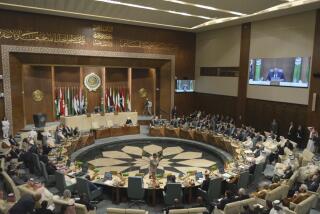Arab League States Sign Treaty to Combat Terrorism
- Share via
CAIRO — The 22 members of the Arab League committed themselves Wednesday to fighting terrorism, by signing an accord designed to ensure that their governments will not tolerate or give support to groups or individuals mounting terrorist attacks in other Arab countries.
“This treaty will allow Arab countries to shatter the networks of terrorism . . . especially the networks of funding and support,” said Algerian Justice Minister Mohammed Adami, whose nation has been the worst-hit in the region by terrorist violence.
Egyptian Interior Minister Habib Adli, who said terrorism in the region “stops the wheels of growth and development,” observed, “We are facing dangers that cannot be ignored.”
The 42-point treaty, which will take effect one month after it has been formally ratified by at least seven of the signing nations, calls on Arab states to refrain from giving training, sanctuary or financial or military aid to groups that mount attacks against other Arab countries. It requires participants to exchange information about terrorist groups and to extradite suspects or individuals convicted in terrorist crimes.
But the treaty excludes from its definition of “terrorism” those who are fighting for “liberation and self-determination.” This exception affects anti-Israeli groups such as Hezbollah and Hamas.
Hezbollah opposes Israel’s presence in southern Lebanon, and Hamas says that it is battling for a Palestinian homeland when its members engage in suicide bombings in Israel--attacks that have killed dozens of Israelis in the past year.
The treaty is mainly aimed at organizations such as the Armed Islamic Group in Algeria and Gamaa al Islamiya in Egypt. The Algerian government blames the Armed Islamic Group for a large part of the estimated 65,000 slayings of Algerians since 1992.
Gamaa al Islamiya has been blamed for the attack that killed 58 tourists at Luxor in November as well as for assaults against Christians, foreigners and intellectuals over the past six years.
Egypt and Algeria, the treaty’s main proponents, have long complained that militant Islamic groups battling their governments have benefited from funding and moral support from abroad.
Supporters hope that the accord also will let Arabs speak in a unified voice when they demand that Western countries stop giving asylum to those suspected of planning or funding terrorist activities in Arab countries.
Arab ministers also said they hope that the treaty will help counter Western media depictions linking Islam with terrorism.
Terrorism “completely violates Islam, which holds human life in high regard, while terrorism treats it cheaply,” said Saudi Interior Minister Nayif ibn Abdulaziz. He and other Arab ministers of justice or the interior signed the treaty at the heavily fortified Arab League headquarters here.
A pan-Arab treaty against terrorism was first proposed in 1987, and work began on it in earnest in 1994. One stumbling block was how to draft it so that it would condemn terrorism and those who support it without, for example, attacking countries such as Syria that have sponsored armed anti-Israeli groups.
Hussein Hassun, Syria’s justice minister, said the accord shows that the Arab world rejects terrorism while endorsing the rights of those struggling for self-determination and opposing “foreign aggression.”
Aline Kazandjian of The Times’ Cairo Bureau contributed to this report.
More to Read
Sign up for Essential California
The most important California stories and recommendations in your inbox every morning.
You may occasionally receive promotional content from the Los Angeles Times.













